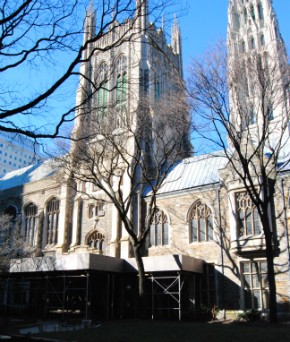Housing venture roils Union Seminary

A luxury housing construction project in the works at Union Theological Seminary could potentially save the school’s Upper Manhattan campus by raising more than $100 million for urgently needed renovations and repairs.
But supporters say it’s a risky venture with no guarantees of success. And opposition is mounting from stakeholders who worry that the institution, renowned for solidarity with society’s poor and marginalized, could lose its soul in the process.
At issue is a plan to build condominiums on half of Union’s two-block campus in the Morningside Heights neighborhood. Faculty would live on lower floors, while the two-, three-, and four-bedroom units above the eighth floor would sell at market rates, ranging from nearly $2 million to $5 million.
Read our latest issue or browse back issues.
Administrators insist that Union has no choice but to swiftly sell development rights for its parcel abutting 122nd Street, where residents would have views of Manhattan and the Hudson River. Proceeds would go to renovate classrooms and to update aging infrastructure, which includes unreliable steam heating and old lead pipes buried under concrete, and to allow the school to comply with city mandates to make the stone facade safe.
“If Union decided not to do this, it would simply mean that eventually our whole campus would be sold to a developer who would come along and do it,” said Serene Jones, Union president. “Better that we, in the midst of this environment, use our assets for the sake of our own future.”
Critics fear that the condos could come at too high a cost. Some 278 stakeholders, primarily students and alumni, signed an open letter that was delivered December 2, demanding “a complete and immediate halt” to the project, which is still in the negotiation stage with L+M Development Partners. They say luxury housing projects are pushing low-income and working-class residents out of their neighborhoods, including nearby West Harlem. Signers of the letter lament that the condos proposed for the site would include no units designated for affordable housing. And they allege that L+M has a controversial safety record and relies heavily on nonunionized labor.
For Katrina Forman, a master of divinity student from Pennsylvania, it seems that Union isn’t standing by its principles.
“It feels to me that they are being thrown aside in the name of ‘what we have to do,’” Forman said. “There are choices—they could use union labor, they could demand that real affordable housing be built at no cost to the seminary—that they [Union’s board of trustees and administrators] have not been willing to address.”
Union’s social justice–minded faculty, meanwhile, is caught in the middle. All 24 faculty members live on campus and would move into the new tower. Only three—Cornel West, James Cone, and Chung Hyun Kyung—are on record opposing the project.
Chung wants to see competitive bidding for exterior repairs; she doubts the work has to cost $50 million, as administrators claim. Rather than present the tower as the only option, Chung said, Jones should “do her job” and raise the money needed. Chung worries that Union is diving into “spiritual suicide” with a project that adds to sky-high neighborhood housing costs and further displaces low-income and working-class residents.
“This is really a crisis in Union’s history,” Chung said. “If our president pushes for this and our board accepts her proposal, I don’t know if we will have the same Union Theological Seminary that we used to think of as a liberal, progressive, prophetic Christian educational institution.”
Social ethicist Gary Dorrien served on a strategic planning committee six years ago and now believes the school has no other options, especially with the city’s new mandate about fixing aging facades.
“In some ways, Union is flourishing, but this facade bill is the wrath of God, and it’s coming right down on us,” Dorrien said. “I just think that the well is dry except for this fairly desperate gamble. . . . These developers, they dig a hole for you. You’re in debt. And then have to dig your way out of it and hope this will succeed. It is a gamble.”
Founded in 1836, Union has for decades failed to keep up with the maintenance needs of its stone buildings. But relocating is not an option, Jones said. The school needs to stay in this location for its proximity not only to all of New York City but especially to the immediate neighbors: Columbia University, Jewish Theological Seminary, and other institutions that help advance Union’s mission.
On the quad, a hard-roofed shed over a section of walkway near a building keeps pedestrians safe when they pass by an area where a stone spire toppled to the ground a few years ago. The city requires that such shelters stay up until repairs are made. If Union doesn’t make repairs soon, Jones said, the city could require the school to vacate the property.
Unlike some other mainline seminaries, Union is doing well overall, administrators said. Enrollment is growing, Jones said, and the $110 million endowment helps retain a top-tier faculty. The sole major challenge lies in renovating the campus, and funds for the work are scarce because endowment resources are off-limits.
Union has already exhausted all other options, Jones said. About half the campus is leased to neighboring Columbia University, but Columbia isn’t interested in partnering further on making essential improvements. Raising $100 million to $120 million from donors isn’t feasible.
The condo plan isn’t perfect, administrators admit, especially since affordable housing inside the proposed tower is not an option. According to Jones, affordable units, which are priced in proportion to local median incomes, wouldn’t generate enough profits now that a key state tax abatement program, known as 421A, has expired.
Union can’t afford to wait for lawmakers to act on affordable housing incentives, according to Fred Davie, executive vice president. He said the creation of new affordable units in New York will somehow be part of the deal. One possibility: Union might become an equity partner in an off-site project where such units can benefit another New York neighborhood.
“Gentrification is done,” Davie said. “It’s been done for a decade in this neighborhood. Essentially there are no residential communities, really, that are going to be impacted by Union’s project.”
But critics are holding out for what they regard as a better deal.
“What people come here for is to be social justice advocates and social justice ministers and intellectuals,” said Jason Wyman, a Ph.D. candidate in social ethics and a nonparticipant in the condo debate on campus. “To feel like the institution is in any way selling that out makes people feel like they’ve come under false pretenses.”
Forman said Union knew the 421A provision would be expiring and is now using its termination as “an excuse” not to integrate affordable units. In her view, affordable units are still doable if the school negotiates for them.
“Four twenty-one A is a tax break for the developer,” Forman said. For Union administrators “to be saying that we can’t do affordable housing because 421A expired is taking the developer off the hook. It’s saying they have to make their profits, so we can’t ask them to do that. And that’s a cop out.”
Union responded to critics by agreeing to make new disclosures related to the proposed project and the school’s financial status. Administrators expect to sign a deal and announce its terms this spring. —for the Christian Century
This article was edited on February 16, 2016.





